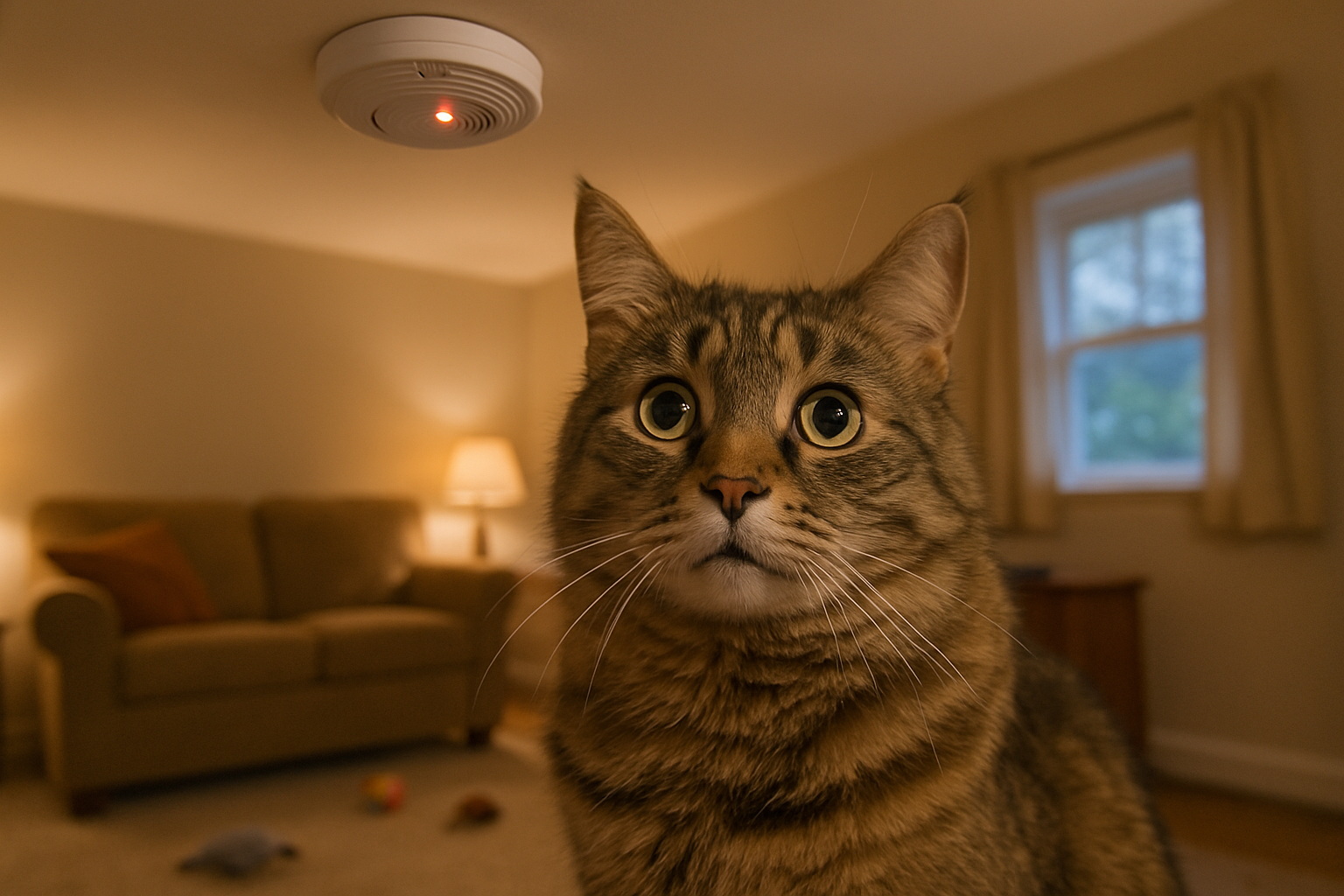Fire alarms are crucial devices designed to alert us in emergencies, jolting us to safety. But if you have cats at home, you might wonder if these shrill, piercing sounds could harm your feline friends’ sensitive ears. Cats naturally have far more acute hearing than humans, able to detect frequencies from 48 Hz all the way up to 85 kHz, which means what sounds merely loud to us could be downright painful or stressful to them. As fire alarms designed by top companies like First Alert, Kidde, Nest, and Honeywell typically emit sounds ranging from 65 to 120 decibels, the question “Do fire alarms hurt cats’ ears?” is more than valid.
Many cat owners have reported their pets reacting nervously or trying to hide when alarms go off, showing how distressing the sounds can be. But can these alarms actually inflict physical damage on cats’ hearing, or do they just cause temporary discomfort and emotional stress? In exploring this, we’ll delve into how sound impacts feline hearing, the loudness levels of common fire detection systems such as System Sensor, FireAngel, Brk Brands, XSense, and SimplexGrinnell, and actionable steps to protect your kitties while ensuring your home stays safe from fire risks.
Understanding what happens to a cat’s ears during alarm sounds is essential, since prolonged or repeated exposure to intense noise above 85 decibels is widely recognized by experts like the National Institute on Deafness and Other Communication Disorders (NIDCD) as a potential risk factor for hearing impairment. Let’s explore whether fire alarms push this boundary for cats, and how to manage your home environment to keep both your pet’s ears and your safety systems in check.
How Loud Fire Alarms Impact Cats’ Hearing Sensitivity
Cats possess one of the most sophisticated auditory systems in the animal kingdom, adapted for high-frequency hunting calls and stealthy communication. Unfortunately, this also means they can perceive and sometimes be overwhelmed by noises that many humans barely notice.
Fire alarms are required to be loud enough to rouse everyone in the house during emergencies. Leading brands like First Alert and Kidde manufacture alarms reaching 85 to 120 decibels, often operating near the painful sound thresholds for humans—and even more so for our feline companions. To put this into perspective, normal conversation sits around 60 dB; a vacuum cleaner runs 70 dB; hear a fire alarm scream at 110 dB or more, and you’re venturing into the world of rock concerts or chainsaws.
This intensity can cause:
- 🔊 Startle response: Cats might bolt or freeze unexpectedly.
- 😿 Stress and anxiety: Continuous high decibel exposure causes discomfort and confusion.
- ⚠️ Temporary hearing threshold shift: A reversible muffling following noise exposure.
- 👂 Potential longer-term damage: Due to damage to inner ear hair cells from loud or repeated noise.
In homes with older fire alarms or multiple devices from various manufacturers such as Honeywell and Nest, the combined noise can be even more overwhelming. Cats exposed repeatedly during frequent building drills or faulty sensors can face increased risk—turning alarms from protective devices into sources of auditory distress. This is particularly true if alarms activate near their feeding or resting areas.
Typical Fire Alarm Noise Levels Compared to Common Household Sounds
| Sound Source 🔔 | Decibel Level (dB) 📊 | Effect on Cats 🐱 |
|---|---|---|
| Normal Conversation | 60 | Comfortable |
| Vacuum Cleaner | 70 | Some alertness |
| Fire Alarm (First Alert, First 120 dB) | 85-120 | Startle, potential damage |
| Nearby Construction Work | 90-110 | Stress, potential hearing issues |
Since cats have a wider range of hearing than humans, sounds that might seem merely loud to us could be painfully intense to them. This is why it’s crucial to monitor how often your cat is exposed to fire alarms and to take steps to mitigate unnecessary frequency and volume.
Understanding Temporary vs. Permanent Hearing Damage from Fire Alarms in Cats
Not every blast of a fire alarm will cause lasting harm to your cat’s hearing, but repeated or prolonged exposures to intense sound can. Hearing damage generally falls into two main categories:
- ⏳ Temporary Threshold Shift (TTS): This occurs immediately after exposure to loud noise, causing muffled hearing or ringing in the ears, but typically recovers within hours or days. A cat might seem disoriented or less responsive.
- 💥 Permanent Hearing Damage: Chronic or repeated exposure to loud noise damages the delicate hair cells inside the cochlea, resulting in irreversible hearing loss. The cat might stop responding to sounds or show signs of confusion.
Researchers studying domestic animals have noted that fire alarms that exceed 85 decibels—a common range for devices from BRK Brands and System Sensor—are the threshold from which damage risks increase notably. A single alarm going off briefly might cause some mild temporary discomfort but won’t usually cause permanent damage.
For instance, if your alarm or a neighbor’s FireAngel system blares for minutes on end, or during multiple building drills, your cat faces a real risk of cumulative damage. This is why many vets recommend minimizing exposure to loud sounds and carefully watching cats for signs of hearing problems.
You might notice these signs:
- 👂 Ignoring familiar commands or noises
- 🔕 Lack of reaction to sudden sounds
- 😾 Increased anxiety or hiding behavior
If your cat is showing these symptoms, consulting an expert is advised, especially to rule out external ear infections or other causes. Often, vets prescribe treatments and can advise on protective measures. You can also learn more about proper feline ear care at sources focused on cat health like this specialized site.
Practical Steps to Minimize Fire Alarm Noise Impact on Your Cat
Ensuring your cat’s well-being during fire alarms doesn’t mean disabling these essential safety devices. Instead, smart strategies can help reduce noise exposure for your sensitive companions. Here’s what you can do:
- 🎧 Use ear protection: While earplugs designed specifically for cats are rare, soft earmuffs or creating quiet spaces can help. Some opt to use soundproofing blankets over resting areas during drills.
- 🚪 Safe retreat areas: Set up cozy, quiet hiding spots away from alarms, like carriers or covered beds, which some kittens grow to view positively over time—as endorsed by pet behaviorists.
- 🔕 Routine familiarization: Periodically activating fire alarms at a reduced volume can help desensitize your cat, especially cats raised with carriers out, reducing panic during real events.
- 📅 Schedule drills wisely: If you manage a building or home with frequent alarms from brands like SimplexGrinnell or XSense, try to inform tenants or household members in advance.
- ❌ Avoid prolonged exposure: If a fire alarm malfunctions and keeps ringing, turn it off swiftly and consult a professional technician to avoid both human and animal distress.
Remember, during an emergency, your cat is also vulnerable—so having carriers and evacuation plans ready is key. Knowing which alarms are installed (be it Honeywell or BRK Brands) enables you to identify their loudness and manage expectations accordingly.
Helpful Equipment Brands for Fire Alarm Systems and Pet Safety
| Brand 🛠️ | Primary Use 🔥 | Typical Decibel Range 📊 | Suitability Features (2025) 🛡️ |
|---|---|---|---|
| First Alert | Smoke Detector | 85-120 | Reliable, widely used, often loud |
| Kidde | Fire and Smoke Alarm | 90-115 | Long-lasting battery, rare false alarms |
| Nest | Smart Smoke & CO Detector | 85-105 | Smart alerts, volume control options |
| Honeywell | Smoke Alarm System | 90-110 | Professional grade, connected system |
| Brk Brands | Smoke & Heat Alarm | 85-120 | High sensitivity, loud alarms |
Why Cats React Fearfully to Fire Alarms: The Science of Feline Stress 🔥🐱
While loudness is an obvious factor, there’s more to why cats get spooked by fire alarms. Stress in cats triggered by alarms can manifest severely, affecting their physical and emotional health.
Because cats hear a wider range than humans, their sensory system can detect the sudden, high-frequency shrieks made by fire alarms far more acutely. In response, their bodies activate their fight-or-flight reflexes with bursts of adrenaline and cortisol, just like we’d panic at a thunderclap. But the repetition or unpredictability of fire alarm sounds can push cats into chronic stress states — leading to:
- 😿 Behavioral changes such as excessive hiding or aggression
- 💤 Loss of appetite or disturbed sleep patterns
- ⚠️ Increased susceptibility to illnesses, including ear infections or stress-related diseases
Anecdotes from cat owners highlight how some cats might excessively scratch furniture or display nervous pacing when alarms sound repeatedly, mirroring findings presented by experts on cat scratching behavior. Like humans, they can “associate” the alarms with danger, making even the sight of an alarm unit stressful.
Managing your cat’s reaction involves careful preparation and familiarization. Leaving carriers out for access, as recommended in forums, allows your cat to retreat comfortably during noise events. If you detect signs of chronic stress, consulting with your vet is crucial to address both hearing and behavioral health. You may also want to explore medication guidance for related health issues on specialized sites like this one.
Is There a Direct Link Between Fire Alarm Exposure and Cats’ Long-Term Hearing Health?
Veterinarians and animal auditory specialists have long studied how environmental factors influence feline hearing over their lifetime. Repeated exposure to loud noises like fire alarms, lawnmowers, or even construction noises are potential contributors to gradual hearing loss in cats.
Recent case studies (though still limited) suggest that while a singular exposure to a standard household fire alarm probably won’t severely impact hearing permanently, chronic exposure could incrementally damage hair cells responsible for registering sound frequencies. This damage is lifelong and irreversible.
Proper understanding includes recognizing that some cats with pre-existing ear infections or sensitivities—often caused by parasites, yeast, or bacteria—may be more vulnerable to damage. Vets recommend regular check-ups and may advise treatments including medications like Clavamox, sometimes obtained carefully under prescription or guidance from resources such as specialized veterinary medication guides.
Here’s a helpful table illustrating common ear health risks aggravated by loud noises, including fire alarms:
| Risk Factor ⚠️ | Description 📝 | Prevention Tips 🛡️ |
|---|---|---|
| Ear Infection | Inflammation caused by bacteria or mites, worsened by stress from noise | Regular check-ups, minimize stress, quick vet intervention |
| Hearing Loss | Damage to inner ear hair cells from loud, repeated noise exposure | Limit loud noise exposure, use ear protection when possible |
| Stress-Related Behaviors | Excessive scratching or hiding triggered by environmental stressors | Provide safe spaces, introduce alarms gradually |
Taking proactive measures not only protects hearing but also supports your cat’s overall emotional balance.
FAQs About Fire Alarm Exposure and Cat Hearing Health 🐾
- ❓ Can fire alarms permanently damage my cat’s ears?
Repeated or prolonged exposure to fire alarms emitting above 85 dB can potentially cause hearing damage in cats, especially if close by. However, a single brief alarm is unlikely to cause permanent harm. - ❓ How can I protect my cat during fire alarm tests?
Create quiet retreat areas, use soft ear coverings if possible, and try desensitizing your cat to the sound at a low volume in advance. - ❓ Are some fire alarm brands quieter or safer for pets?
Smart detectors like Nest offer some volume control features, but most alarms prioritize loudness to ensure safety. Positioning alarms away from pet resting zones helps mitigate impact. - ❓ What signs show my cat is suffering hearing damage?
Look for reduced responses to sound, increased hiding, and unusual stress behaviors. Early veterinary check-ups are key to diagnosis. - ❓ Can fire alarms affect kittens differently than adult cats?
Kittens, with developing auditory systems, are more sensitive to loud sounds. It’s extra important to protect young cats from sudden loud noises like alarms.

